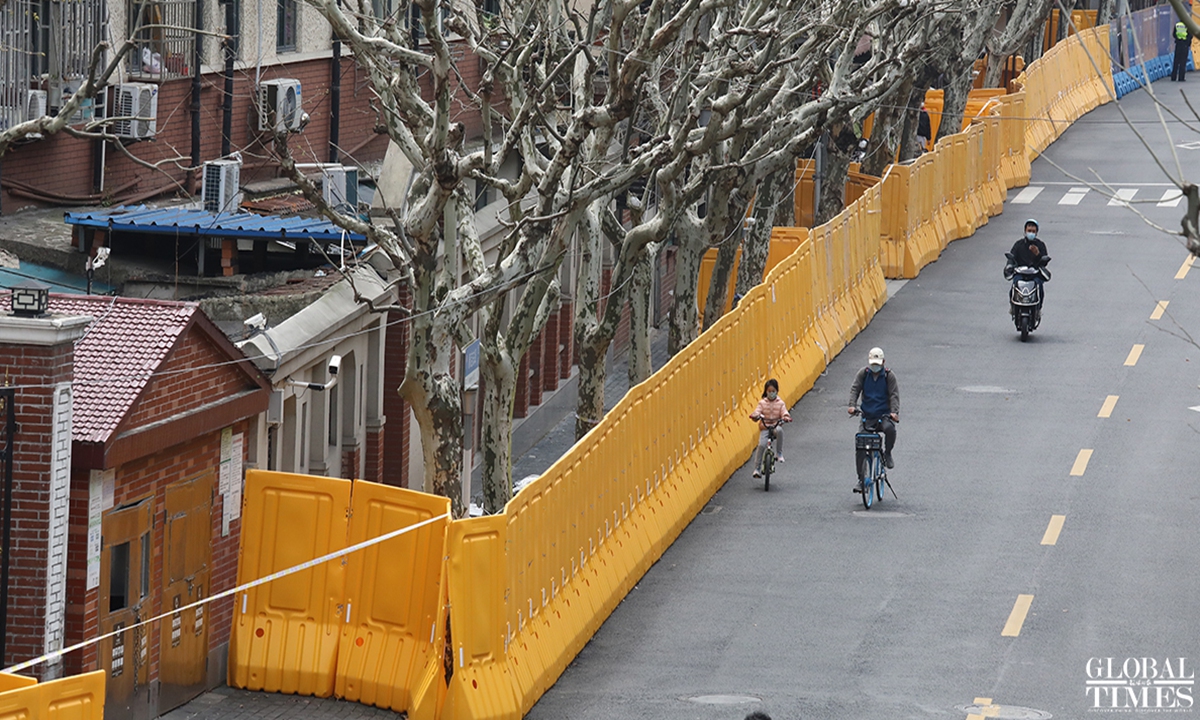
On Kangding road, Jing'an district of Shanghai, street barriers are placed to manage traffic outside the neighborhood communities. Some residents were jogging, while sanitation workers were busy collecting garbage.Photo: Hu Gong
China's three major telecom carriers are scaling up efforts to provide stable networks in Shanghai, including expanding computer cloud servers, increasing coverage of 5G networks and upgrading telecom communication speeds, as the financial and economic hub enters a partial "pause" amid new COVID-19 wave, driving up demand for online networks ranging from education, medical care and epidemic prevention to office work.In a statement sent to the Global Times on Wednesday, China Mobile's Shanghai subsidiary said that it had expanded its network capacity by 300 servers on a contingency basis, and set up a special 24-hour on-site team to guarantee the provision of cloud technology services for the first time.
At the beginning of March, the carrier also ran a trial pressure test for situations under which multiple high telecom demand erupts simultaneously.
In the downtown Huangpu district located in the city's Puxi area, China Mobile upgraded a wireless network for a local hospital in 12 hours, so as to provide telecom support for anti-epidemic work.
The internet speed of the district's education institutions has also been upgraded to 10 gigabits per second to ensure online education is able to be delivered seamlessly.
China Mobile also helped build a 5G and wired broadband network for certain Shanghai companies in the suburban Baoshan district, which remains operational with employees living on-site under closed-loop management.
A spokesperson of China Mobile told the Global Times on Wednesday that the company also set up a team of technological experts to ensure the stable operation of government cloud service platforms, as access demand for mobile apps that track the local health code has also exploded.
China Telecom also sent its emergency 5G station base vehicles out multiple times to set up telecom networks for nucleic acid test sites and concentrated isolation sites, the Global Times learned.
In one instance, the vehicles were sent four times within a day, and it only took a night for the company to complete the optical fiber deployment and telecom network set-up at the Shanghai Chongming People's Stadium - which was later used as a temporary nucleic acid testing site.
Shanghai authorities announced on Sunday night that they were splitting the city roughly into two zones along the Huangpu River for a total of nine days to allow for "staggered" citywide nucleic acid testing.
Some of the city's manufacturing and business services have been suspended, while others moved online, resulting in a sudden hike in network demand.
"As the combat against the coronavirus outbreak enters a crucial stage, digital technology plays a key role. For example, we also developed a cloud-message system, which helps frontline officials get a real-time update on the situation of local communities, and send notification messages to residents 'point-to-point'," the China Mobile spokesperson said.


